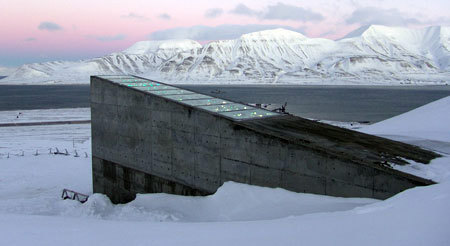Prime Minister Stoltenberg opens Svalbard Seed Vault
Historical archive
Published under: Stoltenberg's 2nd Government
Publisher: Office of the Prime Minister
News story | Date: 26/02/2008
”A global seed vault is necessary to provide a safe haven in the permafrost of Svalbard for the world’s biological diversity. It is a Noah’s Ark for our biological heritage”, Norwegian Prime Minister Stoltenberg said at the opening of the Global Seed Vault in Svalbard to day.
”A global seed vault is necessary to provide a safe haven in the permafrost of Svalbard for the world’s biological diversity. It is a Noah’s Ark for our biological heritage”, Norwegian Prime Minister Jens Stoltenberg said at the opening of the Global Seed Vault in Svalbard to day.
The opening of the seed vault is part of an unprecedented effort to protect the planet’s rapidly diminishing biodiversity. The Svalbard Global Seed Vault, which is established in the permafrost in the mountains of Svalbard, is designed to store duplicates of seeds from seed collections from around the globe. If seeds are lost as a result of climate change, natural disasters, war or simply a lack of resources, the seed collections may be re-established using seeds from Svalbard.
At the opening ceremony Prime Minister Stoltenberg unlocked the vault, and together with the African Nobel Peace Prize-winning environmentalist Wangari Maathai he placed the first seeds in the vault. The President of the European Commission, José Manuel Barroso, and a host of dignitaries and agriculture experts from around the globe deposited seeds during the ceremony.
”Today we have carried the first seeds into this vault. Over the next 24 hours 268 000 seed samples will be placed on the shelves. In the next couple of years the number of samples will be doubled. And finally, we will have more than four million samples, all unique, all secure, here in Svalbard”.
“With so many forces threatening the diversity of life that sustains our planet, Norway is proud to be providing a facility capable of protecting what are not just seeds, but the fundamental building blocks of human civilization,” Prime Minister Stoltenberg said.
The loss of biological diversity is currently one of the greatest challenges facing the environment and sustainable development. The diversity of food crops is under constant pressure. The consequence could be an irreversible loss of the opportunity to grow crops adapted to climate change, new plant diseases and the needs of an expanding population.
Ensuring that the genetic diversity of the world’s food crops is preserved for future generations is an important contribution toward reduction of hunger and poverty in developing countries. This is where the greatest plant diversity originates and where the need for food security and the further development of agriculture is most urgent.

Entrance to the Seed Valut. Photo: Mari Tefre/Svalbard Globale Seed Vault
” Svalbard will now help us to safeguard our food supply, but the Svalbard archipelago already serves the world as an important research centre where scientists work to understand how the climate is changing”, Prime Minister Stoltenberg said.
Norway is pressing forward for a global agreement to reduce emissions of greenhouse gases. This is in line with Norway’s ambitious commitments to reduce global greenhouse gas emissions, but even if we are able to halt the growing CO2-emissions, the challenges of climate change are already threatening bio-diversity. The Norwegian government has therefore funded and is hosting the storage for currently 12 million tonnes of seed, covering 268 000 different samples of seeds from different fields originating from more than 100 countries.
The Svalbard Global Seed Vault is funded and established by Norway as a service to the world. The Global Crop Diversity Trust is providing support for the ongoing operations of the seed vault, as well as organizing and funding the preparation and shipment of seeds from developing countries to the facility. The Nordic Genetic Resource Center will manage the facility and maintain a public on-line database of samples stored in the seed vault, which has the capacity to house 4.5 million samples - some 2 billion seeds.
